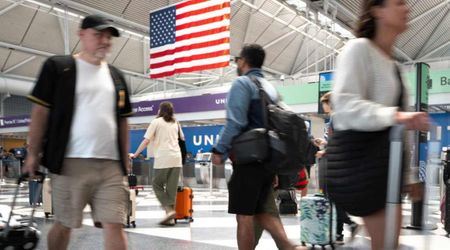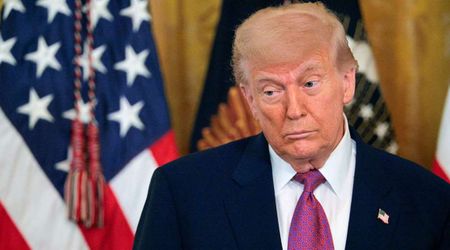CFPB Caps Credit Card Late Fees at $8: Critics Divided on Consumer Impact

The Consumer Financial Protection Bureau (CFPB) finalized a rule on Tuesday to ban excessive late fees charged by credit card companies. The new rule will cut late fees from $31 to just $8 when it comes into effect. The agency claims that it will close a loophole that large card issuers exploited and save Americans over $10 million in late credit card payment fees. As per CFPB’s estimates, there will be an average savings of $220 per year for over 45 million people who are charged late fees by card companies.
New CFPB rule caps banks' credit card late fees at $8 https://t.co/ikuPmjtIpw
— CNBC (@CNBC) March 5, 2024
The crackdown on late fees comes as part of the broader initiative taken up by the Biden administration to limit so-called junk fees. Biden announced the battle against hidden surcharges that consumers pay on credit cards, loans, and hotel rooms.
"Today's rule ends the era of big credit card companies hiding behind the excuse of inflation when they hike fees on borrowers and boost their bottom lines," Rohit Chopra, Director of CFPB, said in a statement.
However, major financial institutions, legislators, and industry groups representing big banks and credit card issuers see the rule with skepticism with many opposing it. The opposers of the rule argue that it could force them to raise interest rates and charge consumers to compensate for costs accrued over late payments.
The CFPB just released new rules that cap credit card late fees at $8 per incident.
— Quiver Quantitative (@QuiverQuant) March 5, 2024
This would cost lenders billions of dollars a year.
Our data has shown banks spending millions of dollars lobbying against this proposal.
They will likely take it to court next. pic.twitter.com/X7CAopkwbY
What Would the New Rule Do?
CFPB’s new rule stems from the Credit Card Accountability, Responsibility, and Disclosure (CARD) Act of 2009, which introduced several reforms and banned credit card companies from charging excessive fees.
However, the CARD Act instructed banks to charge late fees only to recover their costs in collecting the tardy payments. This was deemed as a loophole by the CFPB which it claims allowed credit card issuers to skirt the rules by charging less than $25 for the first late payment fee and then ramping the charges up to $35. With inflation adjustments, this fee was pushed to $30 and $41 respectively.
.@CFPB's new rule on #creditcardfees will save Americans $10 billion in late fees annually, translating to an average savings of $220 per year for the more than 45 million people. That's real money for working families throughout this country. https://t.co/5w9PpqmN62
— Better Markets (@BetterMarkets) March 5, 2024
This cost American families over $14 billion a year in late fees, according to the CFPB. Thus, with the new rule, the agency aims to close the loophole and limit late payment fees to $8.
Response from Banking and Credit Card Companies
Card issuers have slammed the latest rule, warning that it could ultimately hurt consumers by reducing competition and increasing the cost of credit. They have also argued that the rule will cause people to pay late which in turn forces issuers to limit credit access to those who may need it more.
New: US Chamber of Commerce says it will "imminently" file a lawsuit against the @CFPB over new rule banning excessive credit card late fees. @NeilBradleyDC calls the rule "misguided and harmful" + argues the CFPB has "exceeded its authority."https://t.co/1JIW3XH1iV pic.twitter.com/UvjYhPnWwN
— Matt Egan (@MattEganCNN) March 5, 2024
American Bankers Association President and CEO Rob Nichols said, "Today’s flawed final rule will not only reduce competition and increase the cost of credit, but will also result in more late payments, higher debt, lower credit scores, and reduced credit access for those who need it most," in a press release shared with Fox News Digital.
Nichols added that this rule should not be allowed to go into effect.
Pushback Against the Rule
Senator Tim Scott, R-S.C. has announced plans to fight the new rule and its implementation. Scott has argued that the new rule will reduce credit availability and increase interest rates for borrowers.
“Lawful and contractually agreed upon payment incentives promote financial discipline and responsibility," Scott said in a press release on Tuesday. The Senator stated that he will be using the Congressional Review Act process to fight the implementation of CFPB’s rule.
Furthermore, the Consumer Bankers Association (CBA), which represents the nation’s largest retail banks like Capital One, Bank of America, Citigroup, JPMorgan Chase, and Wells Fargo also criticized the new rule.
"The rule’s policy goals are, at best, consumer redistribution, not consumer protection. Equally concerning is that this rule continues the CFPB’s deeply problematic practice of rushing to prioritize headlines at the expense of legal process,” CBA President and CEO Lindsey Johnson said in a Tuesday statement, ABC7 reported.
NEW: @SenatorTimScott announces he will be using the Congressional Review Act process to fight the @CFPB’s final rule to limit credit card penalties.
— U.S. Senate Banking Committee GOP (@BankingGOP) March 5, 2024
His full statement: https://t.co/stMXaXBYO8 pic.twitter.com/LjKecyhqMh
Johnson argued that the rule will only benefit a small section of the cardholders who miss deadlines and hurt about 74% of the cardholders who pay dues on time through increased interest rates and costs that card issuers will be forced to implement to offset costs.























